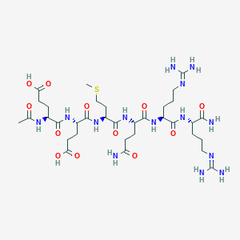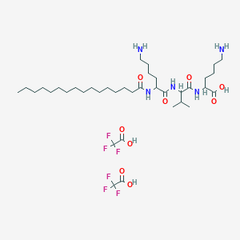Ingredients 101: The Power of Peptides!

A popular ingredient, especially in the anti-aging market, peptides have found a home in skincare products and are here to stay.
If you are looking for a product that will help smooth out, relax and repair wrinkle formation plus improve skin tone and texture then look for ones with peptides in them. Research has shown that better results are achieved with products that contain them, however it also depends greatly on the overall formula, which peptides are used and at what concentrations.
What are peptides?
Peptides, in the simplest form are amino acids linked together forming a chain. Or you can look at them as fragments or the building blocks of proteins. Some are produced naturally in your body and play a role in hormonal regulation. In cosmetics they are usually incorporated into anti-wrinkle, repairing or firming creams.
Peptides developed for use in cosmetics can have many attributes and act as messengers in the skin to communicate actions. Some peptides will relax the musculature via effecting neurotransmission, or increase Collagen production, while others may decrease inflammation and / or repair damaged tissue. They help restructure and strengthen the skin from deep within increasing firmness, strengthening and improving resilience, tone and texture.
What do Peptides do for the skin?
1.) Collagen Production / Firming: These peptides are mainly known for helping to increase your skin’s ability to produce Collagen which restores structure, firms and tightens.
2.) Anti-Inflammatory / Repairing: Peptides that help to increase circulation, strengthen capillaries, repair cellular integrity and reduce inflammation will help to smooth and increase skin’s barrier function. Swelling, discoloration and inflammation are then reduced which ultimately helps to improve the overall skin texture, tone and wrinkled appearance.
3.) Cellular Communication / Relaxing: Some peptides can effect communication between nerves and muscles within the Dermal – Epidermal Junction (DEJ) in skin causing a relaxing or paralyzing effect to expression lines and wrinkles. Argireline (TM) is a popular peptide famous for causing Botox(TM) - like effects that help to reduce the signs of aging and smooth fine lines. You can find Argireline (TM) in our Anti-Aging Serum. Syn-Ake (TM); a peptide developed to mimic a small fragment of snake venom protein, has a paralyzing effect on musculature helping to smooth and soften fine lines and wrinkles. Find this peptide along with 3 others in our most concentrated peptide serum with 17% peptide content in our Wrinkle & Line Correcting Serum.
Popular Peptides in Cosmetics and Skincare:
SYN®-AKE Peptide / Dipeptide Diaminobutyroyl Benzylamide Diacetate
Mimics the action of a neuromuscular blocking compound of the venom of the Temple Viper reducing the appearance of lines and wrinkles.

ARGIRELINE® / Acetyl Hexapeptide-8
Blocks the transmission of nerve signals which cause facial muscles to contract. Although non-toxic, the effect is similar to that of Botox but less pronounced.
SYN®-TACKS Peptide
A combination of two peptides; Dipeptide-5 and Dipeptide-6 stimulate the production Laminin V, Collagen type IV, VII and XVII and Integrin at once. By increasing the production of these proteins the whole structure of the dermal-epidermal junction is improved. Find this peptide combination and others in our Firming Serum and Repairing Moisturizer.

SYN®-COLL / Palmitoyl Tripeptide-5
Often referred to as synthetic collagen, because Palmitoyl Tripeptide-5 mimics the body's own mechanism to produce this youth-giving substance.
Products with these chains of amino acids are generally considered to be anti-aging in nature. It is important to note that the use of peptide for skin care products will not yield results overnight, but daily application may show improvements over time.
Some people don’t notice results because they are too gradual, while some may not see any improvement from a peptide for skin strategy at all. Your specific situation and skin type will play a large role in determining the final outcome.
Want more in depth information to different skin care ingredients and how to use them? Check out our new e-book / paperback available on Amazon.com: Your Best Skin Yet: Popular Natural Ingredients In Skincare and How to Use them: A quick guide to common and natural ingredients to formulate skincare at home or in a professional setting.
References:
1. Angelo, G. (2012). Peptides and Skin Health.
https://lpi.oregonstate.edu/mic/health-disease/skin-health/peptides
2. Leonard, Jayne (2019). What To Know About Peptides For Health Chemistry https://www.medicalnewstoday.com/articles/326701

